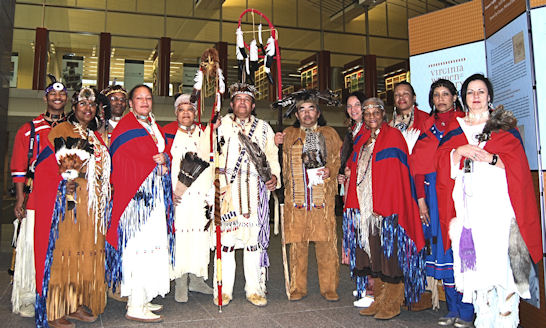By R.E. Spears III/STAFF WRITER/res.spears@tidewaternews.com

RICHMOND—The groundbreaking 19th century Native American chief of a Southampton County tribe is one of eight women whose lives are celebrated in a new traveling exhibition organized by the Library of Virginia.
Library officials unveiled the exhibit during a recent Richmond program capping off Women’s History Month. Twelve members of the Cheroenhaka (Nottoway) tribe, including the current chief, Walt “Red Hawk” Brown, attended the ceremony, dressed in full regalia.
“We were just elated,” Brown said Friday. “It was just a great honor, and it brought a lot of good visibility to Southampton County, also.”
Brown said he was contacted by library officials earlier this year and told of their plan to honor Edith Turner, also known by her tribal name Wané Roonseraw.
He said he believed they had learned of her and her contributions to Virginia history on the Cheroenhaka’s Web site.
“There’s a lot of visibility that has been gained for our tribe by our Web site,” he said. “The visibility of the tribe here in Southampton County over the last seven years has brought this to fruition.”
In 1821, Turner, in her position as chief of the Cheroenhaka (Nottoway) Indians, petitioned the Virginia General Assembly for the right to divide the reservation among individual members, moving them away from a communal lifestyle that was failing the tribe.
“(T)he lands belonging to the said tribe are rendered in a great measure useless by their being held in common, which tenure takes away the main inducement to industry in the cultivation of them,” her petition read.
“It is found to be impossible to divide a common crop, made by a number of persons of various powers, and different Wills, so as to give to each a share strictly proportioned to the part taken in the labour performed, and in consequence of long continued dissatisfaction on that head, at length no crop at all is made.”
In an ironic twist, Turner’s apparent early embrace of capitalism and free-market principles ultimately led to the transfer of all but a tiny portion of Cheroenhaka land to non-indigenous owners.
In 1838, the year of her death, records indicated that the tribe owned as much as 7,000 acres of its former reservation. Just 40 years later, the last 575 acres was divided among members. Today, Brown said, he is aware of only about 15 acres of tribal land that remains in the hands of a direct descendant.
Nonetheless, Turner’s petition is thought to have inspired others Indians to adopt the intensive farming practices of white farmers.
The example she set was especially influential. As the Cheroenhaka (Nottoway) were forced to sell reservation land to pay debts, she prospered on her own farm, remaining self-sufficient and even keeping her own last name when she married William Green.
“She was way ahead of her time,” Brown said. Nonetheless, she cared deeply for her tribe and its culture.
She was a foster mother for two Cheroenhaka (Nottoway) children and was able to convince the tribe’s white trustees to return four other Indian children to the reservation, according to information from the Library of Virginia.
She was one of the last tribal members to speak the Iroquoian language, and she is credited in 1820 with providing a College of William & Mary scholar with a vocabulary of Cheroenhaka words that ultimately wound up in the hands of Thomas Jefferson and is now held at the Library of Congress in Washington, D.C.
Today that vocabulary list is the only existing reproduction of the long-dead Iroquoian language. Turner was the only Cheroenhaka (Nottoway) of her time to write a will, a document that still can be found at the Southampton County courthouse.
In it, she left her personal effects — including a cart with wheels, a heifer and a bull, “four house pigs,” farming tools and kitchen implements — to Edwin Turner, a member of the tribe.
William A. Spark was the recipient of her farm. Brown said there is no record that Spark was Cheroenhaka (Nottoway), but he believes him to be the same William Spark who was later a member of Virginia’s House of Delegates and Senate.
Brown has a special connection to Turner. He is a direct descendant of Mary Polly Woodson, also known by her tribal name Karé Houte. Woodson was one of Turner’s foster children and was one of the signatories of the 1821 petition to the General Assembly.
In honor of his forebearers, when he accepted a crystal bowl and a silver bracelet during the library ceremony March 27, Brown delivered brief comments in the tribe’s native tongue, and then presented library officials with a peace arrow, copies of four tribal magazines and a copy of his own birth certificate and genealogy.
During an interview Friday, Brown looked for the first time at the bracelet he had been given. An inscription read, “Isn’t it amazing what one woman and her friends can do?”

